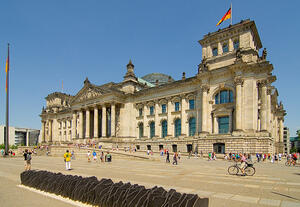The award is organized by the Commission together with the European Disability Forum, and was presented on the occasion of the annual European Day of People with Disabilities conference in Brussels. The prize aims to encourage cities to share their experience and to improve accessibility for the benefit of all.
''People with disabilities still face too many barriers in everyday life, but cities like Berlin are leading the way in making life more accessible for all," said Vice-President Reding, the EU’s Justice Commissioner. "Accessibility offers new business opportunities and can be a real stimulus for innovation and economic growth. That is why accessibility is at the heart of the European disability strategy and why we are preparing our proposals for a European Accessibility Act, which I intend to present next year.”
The jury selected Berlin for its strategic and inclusive disability policy, which has invested heavily in turning the formerly divided city into an accessible, barrier-free environment. The jury highlighted Berlin’s transport system and investment in accessibility for disabled people in reconstruction projects. Berlin's comprehensive approach to accessibility is fully embedded in the city’s policies and broadly supported by its decision-makers.
The other finalists were:
Nantes (France): rewarded for its complete approach to designing a city accessible for all and variety of activities to raise awareness of accessibility in everyday life. Nantes has invested in training for designers and architects and maintains a dialogue with citizens to allow people with disabilities to meet and set up common projects.
Stockholm (Sweden): chosen for its long-term, inclusive approach following Design for All. The “Vision Stockholm in 2030” aims to turn the city, where 30% of the central area consists of water, into a world class city accessible to all. Good examples include accessible pedestrian crossings, public toilets and playgrounds to ensure that they are accessible to children and parents with disabilities.
Europeans strongly believe that disabled people should be able to participate fully in society, according to a new survey by the European Commission released ahead of the European Day for People with Disabilities on 3 December.
Background
'Accessibility' means that people with disabilities have access, on an equal basis with others, to the physical environment, transportation, information and communications technologies and systems, and other facilities and services.
This is the third annual edition of the Access City award. The first went to Avila in Spain and the second to Salzburg in Austria. In addition to the winner and two finalists, this year the jury also assigned special mentions to:
- Pamplona (Spain) for accessible urban environment and sustainable environmental policies. Pamplona set up a four year plan to renovate local infrastructure, including the old town: pavements have been lowered, accessible playgrounds and fitness parks for disabled and elderly people have been installed, and ramps, elevators and footbridges provide accessible solutions in uneven areas of the city.
- Gdynia (Poland) for its ongoing efforts to make public transport accessible: 97% of buses and 58% of trolley buses are now accessible to people with disabilities. The city has also introduced an information system with Braille descriptions and signposts, pylons and information boards accessible to people in wheelchairs.
- Bilbao (Spain) for its use of information and communication technology (ICT) to benefit people with disabilities, including a telephone information service for people with hearing or speech difficulties, simultaneous translation terminals in offices open to the public, and induction loops to eliminate background noise and improve services for people using hearing aids.
- Tallaght (Ireland) for the range of innovative services to improve the quality of life of its citizens with disabilities, including older people. Examples include a 48 hour repair service for streets and pavements, information services, accessible pedestrian walkways, accessible recycling facilities, accessible libraries and books available in different formats for the visually impaired.
For more information: Access City Award www.accesscityaward.eu
Pictures: © az1172 via Flickr

